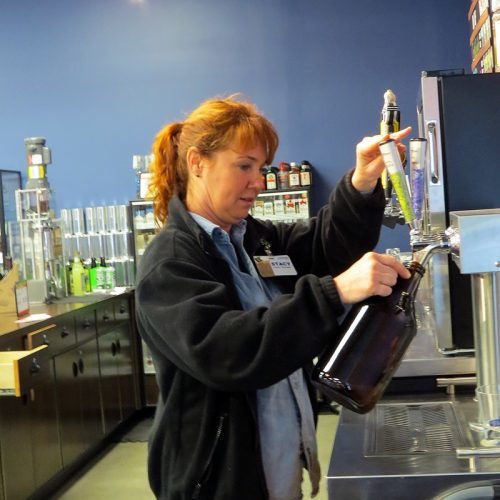 Stacy Stoican, The Cellar liquor manager, fills a 64-ounce growler with kombucha for a Food Market customer. Photo by Danna Webster, KP News
Stacy Stoican, The Cellar liquor manager, fills a 64-ounce growler with kombucha for a Food Market customer. Photo by Danna Webster, KP News
A new brew is on tap on the Key Peninsula. It's called kombucha and is available in The Cellar at the Key Center Food Market and at Local Boys produce in Purdy. The beverage is sold to customers in growlers filled from kegerator taps. Growlers are refillable bottles with capacities of 32, 64 and 128 ounces, and are more commonly filled with beer.
Kombucha is a fermented black or green tea produced by a symbiotic colony of bacteria and yeast (SCOBY) similar to the mother starters used in making sourdough bread and vinegar. It's sometimes called "mushroom tea" when home-brewed because the bacteria and yeast that grow on the surface create a blob that resembles a mushroom. Kombucha may be a historically ancient product but commercially bottled kombucha became available in U.S. stores in the late 1990s, and kombucha on tap is a new distribution system for the tea.
There are claims that kombucha can treat a wide variety of illnesses such as AIDS, cancer and diabetes, and that it can reverse graying hair. Reputable organizations such as the American Heart Association and the American Cancer Society advise there is little scientific evidence for such health claims and there are reports of serious side effects and occasional deaths associated with drinking kombucha tea, especially home-brewed.
Kombucha’s popularity is partly because of the probiotic content of healthy bacteria that studies do show benefit digestion and boost immunity. To maintain the probiotic benefits, the tea must not be pasteurized, which increases the risk of contamination. Commercial brands are pasteurized.
Though kombucha is sold as a nonalcoholic drink, it contains trace amounts of alcohol from fermentation. People sensitive to or avoiding alcohol should be warned. In 2010, Whole Foods recalled the beverage after discovering alcohol levels greater than one-half percent. Today, popular brands keep their brews below the allowed alcohol by volume (ABV).
By comparison, natural fruit juice is less than one-tenth of a percent ABV; kombucha is one-half to 1.5 percent; cider 2 to 5 percent; beer 2 to 12 percent; wine 9 to 16 percent; and whiskey 40 to 68 percent.
Despite the cautions and disqualifiers, kombucha is a hit not only on the Key Peninsula but also around the globe. Some health advocates claim it is overtaking the sale of kale in healthy diet popularity.
Sales are doing well at The Cellar. Quite a few growlers are sold every week, according to operations manager Kip Bonds. "It doesn’t sell as well as the beer, but I’m shocked at how well it does sell," he said, adding that he, too, likes to drink it.
Stacy Stoican, liquor manager at The Cellar, fills most of the kombucha growlers. She has been drinking kombucha for 20 years. "I was drinking it long before it was cool," Stoican said. She enjoys her own home brew and credits an increase in her energy to the tea. She also notices that it helps her rehydrate after running.
The Cellar offers four choices of kombucha and regularly rotates flavors. Customers are invited to taste samples to help them choose before filling their growler. The current favorite, according to Stoican, is Coconut Lime.
UNDERWRITTEN BY THE FUND FOR NONPROFIT NEWS (NEWSMATCH) AT THE MIAMI FOUNDATION, THE ANGEL GUILD, ADVERTISERS, DONORS AND PEOPLE WHO SUPPORT INDEPENDENT, NONPROFIT LOCAL NEWS